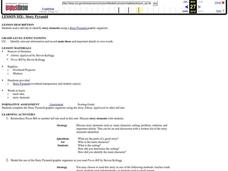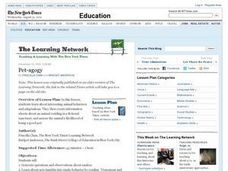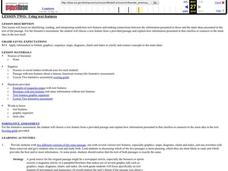Curated OER
TELL THE SEQUENCE IN AN ORAL REPORT
Second graders survey a favorite story he/she has read or heard read aloud. They use the graphic organizer to draw illustrations that show the beginning, middle and end of the story. They tell the title of the story, whether it is...
Curated OER
Understanding Martin Luther King Jr. Day
Third graders explore civil rights by researching the late Dr. King. In this African American leader lesson, 3rd graders read the book Martin's Big Words which explore the foundation of Dr. Martin Luther King Jr.'s principals and...
Curated OER
New Year Celebrations in China (Chun Jie)
Fifth graders compare and contrast the traditions and customs of the holiday with those in Korea and Japan. They express themselves with few non-native grammatical errors in speaking and writing; develop and use background...
Curated OER
Write Me Two Ways
Fifth graders write numbers in standard and expanded form. For this writing numbers in standard and expanded form lesson, 5th graders write integers up to billions in word form and standard form. Students use number cards to...
Curated OER
The House of Dies Drear
Students read The House of Dies Drear and understand how he filled a need and helped people. In this philanthropy lesson students understand how the people who helped on the "Underground Railroad" filled a need and helped others....
Curated OER
If Our Class Went to See the Prince
First graders read the story One Monday Morning and create picture graphs based on the number of teachers, boys, and girls that would visit the prince. In this data lesson plan, 1st graders interpret tables and graphs with the help of...
Curated OER
Becoming Africa's Wildlife
Students take a "trip" to Africa. In this Africa lesson, students watch a National Geographic video on animals from Africa. They pick an animal to research, create a poster about, and make a field guide.
Curated OER
Forces on an Airplane and Resulting Motion
Students read from a NASA Web-based textbook, then students demonstrate an understanding of the text by answering questions about the forces on an airplane and their resulting motions.
Curated OER
Story Pyramid
Students read tall tales to identify story elements. In this story elements lesson, students read about Johnny Appleseed and Pecos Bill and use graphic organizers to record information. Students read in small groups,...
Curated OER
Will the Supreme Court Vouch for Vouchers?
Young scholars investigate past Supreme Court decisions that have centered on education issues and assess the ways in which those decisions have impacted American education. They consider the controversies surrounding the issue of school...
Curated OER
Pet-agogy
Young scholars explore interesting animal behaviors and adaptations. They create information sheets about an animal residing in a fictional sanctuary and assess the animal's likelihood of being a good pet.
Curated OER
It's all In the Package
Learners examine the concept of reducing solid waste and how it relates to product packaging. They read about and evaluate the packaging decisions of two major U.S. corporations, develop a t-chart comparing the pros and cons of various...
Curated OER
Dealing With Anger
Young scholars assess their own anger levels over the past 12 months. Students discuss when it occurs and ways of dealing with it. Young scholars design a questionnaire to measure young people's anger.
Curated OER
Cuba On My Mind
Students explore the Cuban society, politics, culture, and economy. As a class, they take a look at the Bush administrations policy on Cuba after reading "Embargo Remains Until Cuba Alters Policy, Bush Says" from The New York Times....
Curated OER
Parts of a Tree
Students identify four parts of trees. In this plant biology lesson, students read the book Trees and conduct Internet research to identify the parts of the tree. Students take notes from each website and complete an included worksheet.
Curated OER
Using Text Features
Fourth graders read a nonfiction story that is presented to them with graphic features, and presented to them with only the text. In this text features lesson, 4th graders decide what the benefits of text organizers are and create...
Curated OER
Afghanistan: People, Places and Politics
Students discuss their prior knowledge of Afghanistan. They work together to complete a study guide about Afghanistan's people and places. They present their information to the class.
Curated OER
The Three Billy Goats Gruff
First graders read key sentences from the story on sentence strips. They read the story with a partner and act out the story, taking turns acting the parts of the various characters.
Curated OER
A World of Myths
Students read and write myths. For this world mythology lesson, students read and analyze myths from various cultures and then recognize their attributes as they write their own myths to explain natural phenomena.
Curated OER
The Legend of Sleepy Hollow
Students discuss and define folklore, locate town of Sleepy Hollow, NY, on map, calculate distance from Sleepy Hollow to their school, if applicable, review vocabulary list from The Legend of Sleepy Hollow, read story aloud, and write...
Curated OER
The Giving Tree
Fourth graders participate in a shared reading of The Giving Tree. They discuss the relationship between trees and people in the story. Students contribute to a class KWL chart. They create their own KWL chart with at least four things...
Curated OER
Stump the Dump Maze Game
Students complete reading Because of Winn-Dixie individually or as a class. As students reunite Opal and Winn-Dixie in this timed reading comprehension maze game, they demonstrate their understanding of the novel's plot, theme, and...
National Endowment for the Humanities
From Courage to Freedom: The Reality behind the Song
Students study how Frederick Douglass uses language to describe a realistic picture of slavery in his writings which are primary source documents. They examine his use of word choice, imagery, irony, and rhetorical appeals and use slave...
Curated OER
Decisions: Action or Apathy
Students examine the issues of action versus apathy as related to life pressures, values, consequences and career decisions. They read poetry, short stories and plays and respond to issues personally, critically and creatively.

























